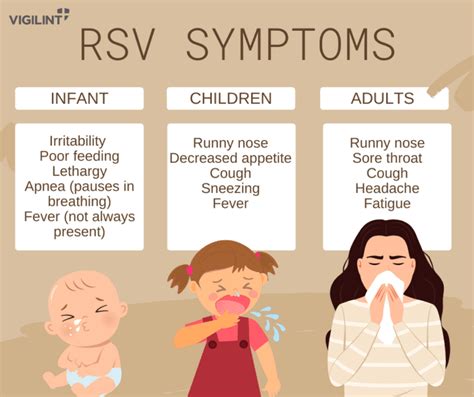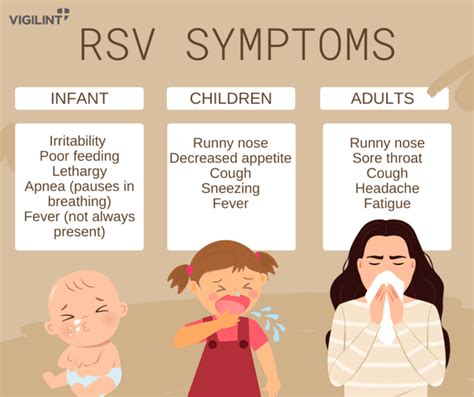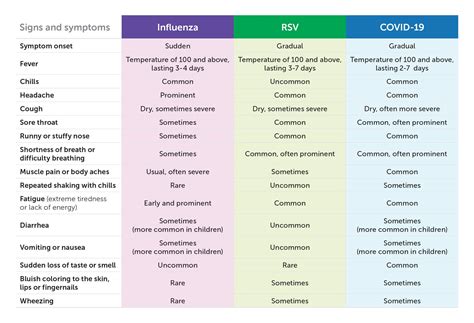Intro
Discover 5 RSV symptoms, including runny nose, cough, and fever. Learn about respiratory syncytial virus infection, diagnosis, and treatment options for infants and adults, and understand the risks of RSV complications, such as bronchiolitis and pneumonia.
Respiratory syncytial virus (RSV) is a common and highly contagious virus that affects people of all ages, but it's most severe in young children and older adults. RSV symptoms can range from mild to severe and can be similar to those of other respiratory illnesses, making diagnosis challenging. Understanding the symptoms of RSV is crucial for early detection and appropriate treatment. In this article, we will delve into the 5 RSV symptoms, their effects on different age groups, and what you can do to prevent and manage the infection.
RSV is a significant public health concern, particularly during the winter months when the virus is most active. According to the Centers for Disease Control and Prevention (CDC), RSV is responsible for approximately 57,527 hospitalizations among children younger than 5 years old in the United States each year. The virus can also affect older adults, especially those with underlying health conditions, leading to severe complications. Recognizing the symptoms of RSV is essential for seeking medical attention promptly and preventing long-term health consequences.
The impact of RSV on families and communities cannot be overstated. Parents and caregivers of young children are often concerned about the risk of RSV infection, and the virus can cause significant disruption to daily life. Moreover, RSV can have a substantial economic burden, particularly for families who need to take time off work to care for a sick child. By understanding the symptoms of RSV and taking preventive measures, individuals can reduce the risk of infection and minimize the spread of the virus.
Introduction to RSV Symptoms

5 Common RSV Symptoms

These symptoms can vary in severity and duration, and some individuals may experience additional symptoms such as sore throat, fatigue, and muscle aches. It's essential to seek medical attention if you or your child experiences severe symptoms, such as difficulty breathing, rapid breathing, or a high fever.
RSV Symptoms in Different Age Groups
RSV symptoms can vary significantly depending on the individual's age. In young children, RSV symptoms can be mild and may resemble those of a common cold. However, in some cases, RSV can cause severe respiratory illness, such as bronchiolitis or pneumonia, which can lead to hospitalization.In older adults, RSV symptoms can be more severe and may resemble those of influenza or pneumonia. Older adults with underlying health conditions, such as heart disease or chronic obstructive pulmonary disease (COPD), are at higher risk of developing severe RSV symptoms.
Diagnosis and Treatment of RSV

Preventing the spread of RSV is crucial, especially in high-risk populations such as young children and older adults. Practicing good hygiene, such as washing hands frequently, avoiding close contact with individuals who have RSV, and avoiding sharing utensils or personal items, can help reduce the risk of transmission.
Prevention and Management of RSV
Preventing RSV infection is essential, particularly in high-risk populations. Some ways to prevent RSV include: * Practicing good hygiene, such as washing hands frequently * Avoiding close contact with individuals who have RSV * Avoiding sharing utensils or personal items * Staying home from work or school if you have RSV symptoms * Getting plenty of rest and staying hydratedIn addition to these preventive measures, there are several management strategies that can help alleviate RSV symptoms. These include:
- Using a humidifier to relieve congestion
- Taking over-the-counter medications, such as acetaminophen or ibuprofen, to reduce fever and relieve pain
- Staying hydrated by drinking plenty of fluids
- Getting plenty of rest to help the body recover
Complications of RSV

It's essential to seek medical attention immediately if you or your child experiences any of these complications.
Long-term Effects of RSV
RSV can have long-term effects on the respiratory system, particularly in young children. Some of the potential long-term effects of RSV include: * Asthma: a chronic respiratory condition that can cause wheezing, coughing, and shortness of breath * Chronic obstructive pulmonary disease (COPD): a progressive lung disease that can cause shortness of breath, wheezing, and coughing * Recurrent respiratory infections: RSV can increase the risk of recurrent respiratory infections, particularly in young childrenIt's essential to work with a healthcare provider to manage and prevent long-term effects of RSV.
Conclusion and Next Steps

If you or your child has been diagnosed with RSV, it's essential to work with a healthcare provider to develop a treatment plan and manage symptoms. By taking preventive measures, such as practicing good hygiene and avoiding close contact with individuals who have RSV, you can reduce the risk of transmission and protect yourself and your loved ones.
We invite you to share your experiences and questions about RSV in the comments section below. If you found this article helpful, please share it with your friends and family to help raise awareness about the importance of RSV prevention and management.
What are the most common symptoms of RSV?
+The most common symptoms of RSV include runny nose and congestion, coughing and sneezing, fever and headache, wheezing and apnea, and loss of appetite and dehydration.
How is RSV diagnosed?
+RSV is typically diagnosed through a physical examination, medical history, and laboratory tests such as rapid antigen detection or polymerase chain reaction (PCR).
Can RSV be prevented?
+Yes, RSV can be prevented by practicing good hygiene, such as washing hands frequently, avoiding close contact with individuals who have RSV, and avoiding sharing utensils or personal items.
What are the potential complications of RSV?
+The potential complications of RSV include bronchiolitis, pneumonia, apnea, respiratory failure, and death, particularly in high-risk populations such as young children and older adults.
How can I manage RSV symptoms?
+RSV symptoms can be managed by using a humidifier to relieve congestion, taking over-the-counter medications to reduce fever and relieve pain, staying hydrated, and getting plenty of rest.
